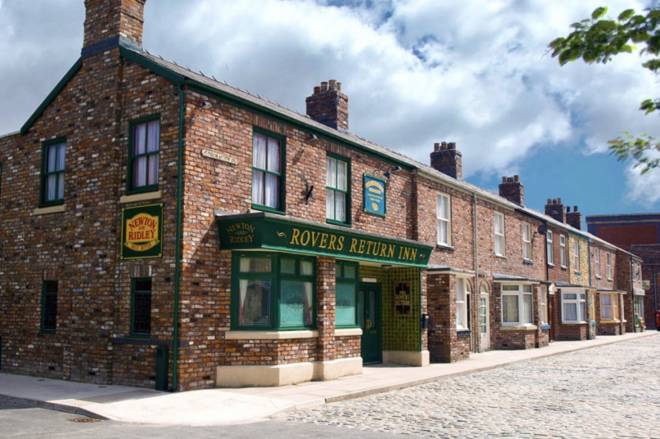How did you feel when you heard there was interest in a TV adaptation of your books?
I was really excited! Then I quickly looked up the producers, saw what they had worked on previously and I was really wowed. My agent in New York warned me there was a very small chance this would actually happen, because it’s so hard to get funding, so the excitement faded, but then it started up again.
I was having breakfast in our kitchen when I found out that Roger Allam was on board and I fell off my stool! I called my husband at work – we’re big fans of The Thick of It and Endeavour, so it was really exciting. People have been congratulating us on the TV series but I haven’t really done anything!
What was your initial inspiration for the books?
We moved to France in 1997 and my husband got a job, but I couldn’t work initially because I didn’t have the right visa. I started writing freelance articles about Aix, about Cezanne, classic stuff. After a few years of doing that, I decided I’d really like to write a book but every time I tried it felt very autobiographical, which I didn’t want. My inspiration was the city of Aix but I wanted to do fiction, and I thought the mystery genre would fit very well. It’s such a beautiful place and you think it won’t have any dark secrets, but of course it does. It’s perfect because it’s a small town where everyone knows everyone, and it’s a famous law town too. We lived in Aix for 17 years in the place that inspired Marine’s apartment, and now we live in the countryside a short drive away.
Is it tricky to write a distinctive crime novel in a crowded marketplace?
Well, I thought Aix was distinctive, because there haven’t been any mysteries set there, they’re usually based in Marseilles. So I think Aix is different, and I also wanted a happy couple at the heart of the story, I didn’t want the brooding alcoholic policeman, so I think that’s different. I don’t read dark crime novels, so I didn’t want the grit – I wanted the humour and the puzzle, the mystery and the beauty of Aix.
I also wanted to show day to day life. Often when people write to me after reading my books, that’s what they talk about –the leisurely pace, the food and wine and the softness that’s unique to Aix. And our lives do involve having friends over for Monday night glasses of wine! I don’t know if British people find that odd, but it really is our life to often have a glass of white wine in hand, just like you’d go for a pint in your local. A lot of our friends are winemakers and chefs, so it’s very important to us and just a way of life, so we wanted that to be part of what you see on screen.
How do you find planning out crime novels, with all the twists and red herrings?
Crime mysteries have a definite structure and that really helped me when I first started. When I initially sat down to write a book I was all over the place – I kept writing about a Canadian woman with a daughter, living in Aix, and then I realised, “Oh, that’s me!” So, writing a mystery within genre really helped me because you do have a frame you have to work in, and I had written down lots of notes.
There’s a beautiful old run-down chateau just outside Aix that I thought would be a great setting for a mystery and I started from there.
How did you feel when you heard about the changes being made for the TV series e.g. making the lead characters older?
I thought it was a great idea, it fits really well. The characters are just at another point of their lives, but they still both have very distinctive personalities and they work really well together. On screen it’s just magic. And I love how their age gets written about too, with Antoine complaining about his prostate and Marine having hot flashes, that’s great.
Bruno has become a female character, Hélène, but they’ve kept certain qualities. In the books, Bruno is the person who brings Antoine back down to earth. He grew up in a really big, close family and has a wonderful wife and a daughter. That gives Antoine this idea that families can be very loving, the opposite of the crazy wealthy family he has in Paris. So, Bruno keeps Antoine in check and Hélène does that as well. She’s very grounded – quite stern but grounded.
How challenging was it to hand over your creation to another writer?
It was easy to hand over the books, because I had faith in the producers to choose a great screenwriter and they did a great job. I was honoured. Just before we watched the first episode, my husband said, “What if we don’t like it?” and of course there’s always a little bit of fear, but I really did have faith in everyone involved in the project, and I love the end result.
We were invited on set one day during filming and it was really wonderful to see it all happening and to observe the relationship between Roger and Nancy on camera. The assistant director asked me if I wanted to do a cameo, but I was too shy, so I sent my daughter in. She’s playing one of the onlookers in a crime scene, where there’s some villages trying to look past the police tape. She was very pleased to do that.
How did it feel when a film crew came to town?
It was really funny, my phone was ringing off the hook! My friends were calling, telling me there was a crew filming in the market, and asking if it had something to do with me. I was like, “Yes, sorry!” But the Aix people were very, very proud, it seemed like everyone was involved or had a story to tell about the shoot.
What was it like watching the episodes for the first time?
It was wild, to start with – you’re just recognising streets and landmarks, then you start to sit back and enjoy it. The second time we watched it, I started to recognise my dialogue. They kept a lot more of the story than I thought they would. I knew there were changes to the characters, but they were very faithful to the stories, which was very flattering, and Aix is a star on screen. The colours and the lights, the church bells and busy cafes, it comes across on screen as the real Aix.
How important is the humour to your books, and the series?
I love humour, I think it’s so important in our daily lives, and it’s something that comes out in French towns like Aix, there’s a constant exchange with people – you joke around with the butcher and the flower seller. You have to laugh, especially as the world gets crazier. I think that both Roger (Allam) and Nancy (Carroll) are really funny. Of course, Patricia Hodge is brilliant as Nancy’s mother Florence, who is one of the humorous elements in the books. She’s a mash-up of lots of French mothers I’ve met! So yes, humour is important and they did a great job on the series.
Why did you decide to make Antoine an investigating judge, rather than a detective?
It’s the highest post in France, and it was the control that interested me. I thought it went well with his character, this fancy Parisian moving down to Aix where he doesn’t know anyone –he’s trying to fit in, but he also has all the control. How is that going to play out with his relationships? He’s actually doing the questioning in these investigations, and that’s the part of mysteries that always interests me most. His status really helped me build his character.
Has the TV series influenced your writing?
No, I have to see it separately because the characters are younger in the books. So I have to stick to the younger version. I’ve just finished the 10th novel, which comes out later in the year. The ideas are easy, and I think I can keep going, it’s just finding the time to sit down and write them!
I have 1,000,001 ideas – every time I read our local newspaper, La Provence, you find great little articles about arguments between two villagers, which would make a great story. There’s so much going on in Aix – I’ve haven’t written about the Opera Festival, or really explored the Roman history of Aix yet.
Latest Interviews
[pt_view id=”93d5b1f3zw”]
News Highlights
[pt_view id=”32353a785p”]












